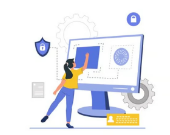As we progress through National Cybersecurity Awareness Month this October, Week 3 focuses on a vital topic: protecting personal information. Understanding how to safeguard personal information is essential for maintaining privacy and security. We will explore the importance of protecting personal information, the risks associated with data exposure, and practical steps everyone can take to keep their information safe.
Why Protecting Personal Information Matters
Personal information includes any data that can be used to identify an individual, such as names, addresses, email addresses, phone numbers, Social Security numbers, and financial information. Here’s why it’s crucial to protect this information:
- Identity Theft: One of the primary risks of failing to protect personal information is identity theft. Cybercriminals can use stolen data to impersonate individuals, access bank accounts, and create fraudulent accounts, leading to significant financial and emotional distress.
- Loss of Privacy: Personal data can be misused for various purposes, including targeted advertising, harassment, or even stalking. Safeguarding personal information helps maintain an individual’s privacy and autonomy.
- Reputation Damage: Exposure of sensitive personal data can lead to reputational harm. This is particularly concerning for professionals whose personal and professional lives are interconnected.
- Financial Loss: Data breaches can result in direct financial loss, including theft from bank accounts or credit cards. Protecting personal information minimizes these risks and potential financial repercussions.
Practical Steps to Protect Your Personal Information
- Use Strong, Unique Passwords
Passwords are your first line of defense against unauthorized access. Always create strong passwords that include a combination of upper and lower case letters, numbers, and special characters. Avoid using easily guessed information such as birthdays or common words. Additionally, use a unique password for each account to reduce the risk of a widespread breach.
- Enable Two-Factor Authentication (2FA)
Two-factor authentication adds an extra layer of security by requiring not just a password but also a second verification method before gaining access to an account. This could be a code sent to your phone or an authentication app. Activating 2FA can significantly enhance your online security.
- Be Cautious with Personal Information Sharing
Think before you share personal information online, especially on social media. Limit what you post, and adjust privacy settings to restrict who can see your content. Be wary of friend requests or messages from unknown individuals, as they could be phishing attempts.
- Monitor Your Accounts Regularly
Check your bank and credit card statements regularly for any unauthorized transactions. Early detection of suspicious activity can help mitigate damage. Additionally, consider setting up alerts for transactions that exceed a certain amount.
- Be Wary of Phishing Attempts
Cybercriminals often use phishing scams to trick individuals into revealing personal information. Be cautious with emails or messages that ask for sensitive information or prompt you to click on strange links. Always verify the source before providing any information.
- Use Privacy Settings on Devices and Applications
Take advantage of privacy settings on your devices and applications. This includes disabling location tracking for apps that don’t require it, adjusting social media privacy settings, and managing permissions for apps that access your personal information.
- Secure Your Devices
Ensure that all your devices, including smartphones, tablets, and computers, have up-to-date antivirus software installed. Use firewalls and ensure your operating system and applications are regularly updated to protect against vulnerabilities.
- Use Encrypted Connections
When accessing sensitive information, ensure that your connection is secure. Look for “HTTPS” in the URL and a padlock icon in the browser’s address bar. Avoid entering personal information on public Wi-Fi networks; use a Virtual Private Network (VPN) for an extra layer of security if necessary.
- Be Aware of Data Breaches
Stay informed about data breaches that may affect you. Many services offer credit monitoring to alert you if your information has been compromised. Regularly check whether your accounts have been involved in data breaches by using tools like Have I Been Pwned.
As we highlight the importance of protecting personal information during Week 3 of National Cybersecurity Awareness Month, we remind ourselves that safeguarding our data is essential in today’s interconnected world. By implementing these practical measures, individuals can reduce their vulnerability to cyber threats and protect their personal information from unauthorized access.
Remember, cybersecurity is not just the responsibility of organizations; it begins with each one of us. Stay informed, stay vigilant, and take proactive steps to protect your personal information. By doing so, you contribute to a safer digital space for yourself and everyone around you.
